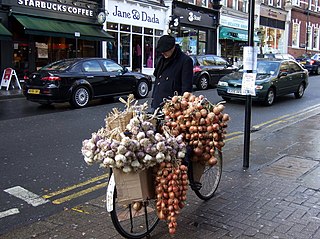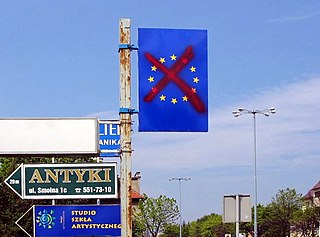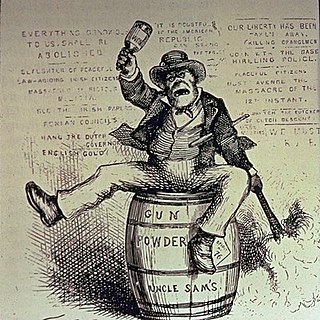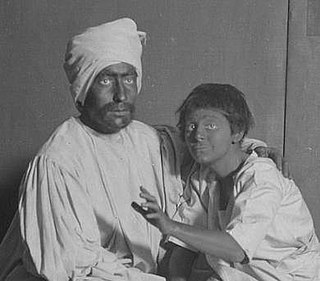
A restaurant is a business that prepares and serves food and drinks to customers. Meals are generally served and eaten on the premises, but many restaurants also offer take-out and food delivery services. Restaurants vary greatly in appearance and offerings, including a wide variety of cuisines and service models ranging from inexpensive fast-food restaurants and cafeterias to mid-priced family restaurants, to high-priced luxury establishments.

Xenophobia is the fear or dislike of anything which is perceived as being foreign or strange. It is an expression which is based on the perception that a conflict exists between an in-group and an out-group and it may manifest itself in suspicion of one group's activities by members of the other group, a desire to eliminate the presence of the group which is the target of suspicion, and fear of losing a national, ethnic, or racial identity.

A gratuity is a sum of money customarily given by a customer to certain service sector workers such as hospitality for the service they have performed, in addition to the basic price of the service.

Anti-English sentiment, also known as Anglophobia, refers to opposition, dislike, fear, hatred, oppression, and persecution of English people and/or England. It can be observed in various contexts within the United Kingdom and in countries outside of it. In the UK, Benjamin Disraeli and George Orwell highlighted anti-English sentiments among Welsh, Irish, and Scottish nationalisms. In Scotland, Anglophobia is influenced by Scottish identity. Football matches and tournaments often see manifestations of anti-English sentiment, including assaults and attacks on English individuals. In Wales, historical factors such as English language imposition and cultural suppression have contributed to anti-English sentiment. In Northern Ireland, anti-English sentiment arises from complex historical and political dynamics, including the IRA's targeting of England during the Troubles.
"Cheese-eating surrender monkeys", sometimes shortened to "surrender monkeys", is a pejorative term for French people. The term is based on the stereotype of the French that they surrender quickly. It was coined in 1995 by Ken Keeler, a writer for the television series The Simpsons, and has entered two Oxford quotation dictionaries.

Anti-Chinese sentiment is a fear or dislike of China, Chinese people or Chinese culture, also referred to as Sinophobia. It often targets Chinese minorities living outside of China and involves immigration, development of national identity in neighbouring countries, political ideologies, disparity of wealth, the past tributary system of Imperial China, majority-minority relations, imperial legacies, and racism.
Anti-Japanese sentiment involves the hatred or fear of anything which is Japanese, be it its culture or its people. Its opposite is Japanophilia.

Onion Johnnies were Breton farmers and agricultural labourers who travelled, originally on foot and later on bicycles, selling distinctive pink onions door to door in Great Britain, and especially in Wales where they share linguistic similarities.
Anti-Russian sentiment, commonly referred to as Russophobia, is dislike or fear or hatred of Russia, Russian people, Russian culture, or Russian policy. The Collins English Dictionary defines it as intense and often irrational hatred of Russia. It is often related to anti-Soviet and occasionally also to anti-Slavic sentiment. The opposite of Russophobia is Russophilia.
Anti-French sentiment is the fear of, discrimination against, or hatred towards France, the French people, French culture, the French government or the Francophonie. It has existed in various forms and in different countries for centuries. The phenomenon has been strongest in Britain and Germany, and was often expressed in literature and the popular medium. It is also a major factor in some Canadian cultures.

Anti-Europeanism and Europhobia are political terms used in a variety of contexts, implying sentiment or policies in opposition to Europe.
Stereotypes of East Asians in the United States are ethnic stereotypes found in American society about first-generation immigrants and their American-born descendants and citizenry with East Asian ancestry or whose family members who recently emigrated to the United States from East Asia, as well as members of the Chinese diaspora whose family members emigrated from Southeast Asian countries. Stereotypes of East Asians, analogous to other ethnic and racial stereotypes, are often erroneously misunderstood and negatively portrayed in American mainstream media, cinema, music, television, literature, video games, internet, as well as in other forms of creative expression in American culture and society. Many of these commonly generalized stereotypes are largely correlative to those that are also found in other Anglosphere countries, such as in Australia, Canada, New Zealand, and the United Kingdom, as entertainment and mass media are often closely interlinked between them.
Stereotypes of American people can today be found in virtually all cultures. They are often manifest in America's own television and in the media's portrayal of the United States as seen in other countries, but can also be spread by literature, art, and public opinion. Not all of the stereotypes are equally popular, nor are they all restricted to Americans; and although most can be considered negative, a few assign neutral, positive or admiring qualities to the stereotypical U.S. citizen. Many of the ethnic stereotypes collide with otherwise unrelated political anti-Americanism.

Anti-Irish sentiment includes oppression, persecution, discrimination, or hatred of Irish people as an ethnic group or a nation. It can be directed against the island of Ireland in general, or directed against Irish immigrants and their descendants in the Irish diaspora. This sentiment can also be called Hibernophobia.
Anti-Korean sentiment or Koryophobia describes negative feelings towards Korean people, Korean culture, or the countries of North Korea or South Korea.

Stereotypes of Germans include real or imagined characteristics of the German people used by people who see the German people as a single and homogeneous group.
Anti-Vietnamese sentiment involves hostility or hatred that is directed towards Vietnamese people, or the state of Vietnam. This may be due to negative perceptions created by historical wars or xenophobic sentiments that emerged from the event of refugee Vietnamese. National or regional discrimination can also occur.

Brownface is a social phenomenon in which a white or light-skinned person attempts to portray themselves as a "brown" person of color, but less overtly and with a lighter complexion than traditional blackface. This may include mimicry of North African, West Asian, South Asian, Southeast Asian, Melanesian, Micronesian, Polynesian, Hispanic/Latino, Native American or other Indigenous groups, including olive-skinned Caucasians such as Southern Italians, Sicilians, Greeks, Arabs, Persians and/or ethnic identity by using makeup, hair-dye, and/or by wearing traditional ethnic clothing. It is typically defined as a racist phenomenon, similar to blackface.
Stereotypes of British people are found in several cultures. Some stereotypes relate to many specific ethnic groups of Britain while others are directed at British nationals in general.
In the Western world or in non-Asian countries, terms such as "racism against Asians" or "anti-Asian racism" are typically used in reference to racist policies, discrimination against, and mistreatment of Asian people and Asian immigrants by institutions and/or non-Asian people.










